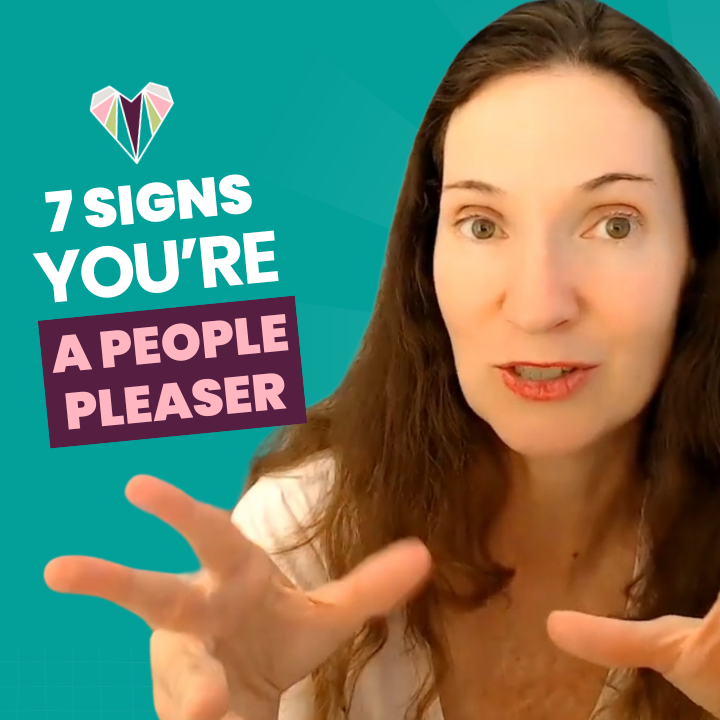Has anyone ever called you a people pleaser? Deep down, you think they may have a point, but you’re resisting the label. Or maybe you openly own and declare yourself to be a people pleaser, sometimes proudly, and other times, in shame at how people pleasing has wreaked havoc in your life.
Let’s take a closer look at what being a people pleaser really means, and how to know if it’s running the show in your life. Let’s start by identifying the signs.
7 Signs You’re a People Pleaser
Here’s a quick video I created for you, where I share the 7 most common signs you’re a people pleaser (and how they might be draining your joy, energy, and confidence).
Catch 7 Signs You’re a People Pleaser on Spotify
7 Signs You’re a People Pleaser
Recognizing the Pleaser Saboteur Before It Burns You Out
1. You put others’ needs before your own
You absorbed the belief that it’s better to give than receive, and you wear it like a badge. It’s almost like there’s an unwritten law that everyone else’s needs and wants must come before yours.
Then you run yourself ragged bending over backwards for everyone, doing it all with a smile, until you’re completely spent.
And, over time, you secretly start to stew, to resent, to fume, until one day you explode (and no one knows what they’ve done wrong).
2. You say yes when you mean to say no
And sometimes curse yourself for doing so. Mostly, you do this to avoid conflict or to win someone’s approval. When you do say no, you feel you have to justify your no with a bunch of valid reasons so no one gets hurt.
3. You feel crushed if someone calls you selfish
You fear being seen as a bad person, and below that lies the deeper fear of loneliness, dying friendless and alone.
4. You’re always rescuing others
People, partners, pets… you’re the fixer, the helper, the emotional EMT. The thing is, while you’re out saving the planet, who’s back here looking after you? Is self-care even on your long to-do list?
5. You tell white lies or flatter people
You’re big on compliments, and mostly you mean it. Yet there are times when you’ll stretch the truth a little, just to avoid upsetting someone you love, or to keep the peace.
6. You pretend to agree with people
Even when you don’t, just so they’ll like you, just so they’ll look up to you, or compliment you back. You’re a regular Miss Congeniality. You’re a lover, not a fighter.
7. You’re feeling overcommitted, overwhelmed, and utterly exhausted
This is a big red flag. You feel like you’ve given so much that there’s nothing left to give. Your cup is empty. This might have gotten so out of control already that you’ve made yourself, mentally, physically, emotionally, and even spiritually.
Constant overgiving can lead to the kind of depletion that causes chronic stress, and chronic stress can lead to a myriad of health problems, from aches to pains to frequent infections to depression to arthritis to cardiovascular disease, and even heart attack or stroke.
If you relate to any of these, and especially if you relate to all of these, I want you to hear this:
People pleasing is not who you are — it’s a survival strategy you learned. And it can be unlearned.
Why People Pleasing Feels So Right (and Goes So Wrong)

On the surface, it looks like love, kindness, and generosity. But under the surface?
People-pleasing often stems from fear — the fear of rejection, disapproval, or abandonment. We say yes when we mean to say no. We give beyond our capacity. We pretend to agree. We avoid conflict at all costs.
Over time, this leads to burnout, resentment, and even toxic relationships.
This is the work of what Positive Intelligence® calls the Pleaser Saboteur — the part of you that believes love must be earned by serving everyone else first.
But here’s the good news:
You can break free. And the first step is awareness.
Take the Saboteur Assessment
Want to know for sure if the Pleaser is your dominant saboteur?
? Take the free Saboteur Assessment by Positive Intelligence®. It takes just 5 minutes and gives you a detailed profile of how self-sabotage might be showing up for you.
? Click here to take the Saboteur Assessment
What Happens When You Stop People Pleasing
When you begin to shift out of people-pleasing, something magical happens:
- You start hearing your own voice again.
- You recognize your needs without guilt.
- You say no with love — and without explaining.
- You reclaim your time, energy, and self-worth.
The change isn’t instant. But with awareness, compassion, and practice, it’s possible.
And I’d love to walk beside you on that journey.
People pleasing can feel noble. It can feel generous. But if you’re constantly overextending yourself, sacrificing your well-being, and feeling underappreciated, it’s time to pause and reflect. There’s a difference between healthy generosity and self-abandonment.
When you give from a full cup, your kindness is sustainable. It energizes instead of depletes. That’s why learning to say no — lovingly, firmly, and without guilt — is one of the most important acts of self-care a recovering people pleaser can practice.
? Book a free clarity call
? Join my soulful community
You are not selfish. You are not broken. You’re simply ready to come home to yourself.
What pleases YOU?
Let that be your new starting point.
And, if you haven’t downloaded it yet, visit whatlightsmeup.com to download the guide I created especially for people-pleasers like you and me. So we can start putting ourselves first for a change, refill our cups, discover what lights us up, and then do those things more often.
Or not. Unless you’d rather remain on autopilot, in default mode, seeing to everyone else’s needs before your own.
Just be warned, it comes at a cost. It will take its toll.
How many of these 7 signs you’re a people pleaser, sound like you? What has been the impact of people pleasing on your life? Let me know in the comments.

